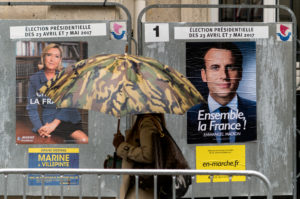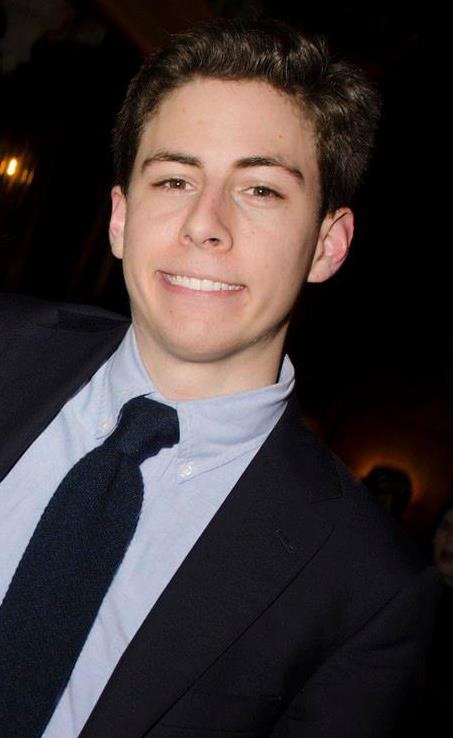Centrist (by European standards) presidential candidate and now President-elect Emmanuel Macron won over French voters Sunday in a landslide victory with 66.1 percent of the vote versus the far-right National Front candidate Marine Le Pen’s 33.9 percent. The 39-year-old former investment banker won over French voters with a youthful energy—comparable to that of then-Senator Obama’s 2008 campaign of hope and change (which led Obama to endorse Macron)—and because of the wariness French voters had of committing to Le Pen’s National Front, whose ideological roots date back to France’s Vichy-era government.
A specific policy difference between Macron and Le Pen that may have proved decisive was Macron’s firm commitment to maintaining strong ties with the rest of Europe and keeping France in the European Union, while Le Pen promised a referendum to leave the EU, much like the Brexit vote. Besides a firm commitment to the European Union though, Macron was rather vague on his policy goals, and many French voters saw him as a walking Rorschach test: voters saw what they wanted to see in him, and it was a different sight for each and every voter.

Since Macron had a distinct appeal to French voters who were tired of party politics as usual (as the candidate for En Marche!, he ran unaffiliated to any traditional political party but previously served as Minister of the Economy under incumbent Socialist President François Hollande), he has a great deal of latitude on how to go about managing French foreign policy. Conservatives see in Macron someone who says he supports a military intervention in Syria (ideally with a United Nations mandate), and liberals see a politician who will keep France in Europe. Now that Macron has won the election, he must not be tempted to solely keep France engaged with Europe, but isolated from the rest of the world.
Hollande ultimately did not run for reelection due to historically low approval ratings, largely as a result of a sluggish economy and failed domestic policy goals. Despite Hollande’s failures within France’s borders, there is no doubt that he succeeded in navigating the complex waters of foreign policy in an increasingly unstable post-Cold War world. Back in January 2013, Hollande sent hundreds of French troops to Mali to ensure the country’s government did not fall as Al Qaeda-affiliated terrorists were headed towards the capital, Bamako.
After sending French forces into Mali, Hollande found himself necessarily putting more French troops at risk in Africa once again, when in December 2013 he sent 2,000 troops to the Central African Republic (CAR) on a peacekeeping mission to put an end to mass killings in the wake of the overthrow of former President François Bozizé. It was announced in October 2016 that Operation Sangaris, as it was known, was coming to an end but that 350 French troops would remain in the country to ensure continued stability and support over 10,000 UN peacekeepers. In a further commitment to African countries, Hollande has seen to it that ever since 2013 France trains over 20,000 African troops a year, according to France 24. It is believed that 25,000 African troops will receive French military training by 2020.
Not only has Hollande justifiably and proportionally involved French military might in Africa, but he also ordered airstrikes against ISIS in Syria back in September 2015, two months before ISIS killed 130 people in the streets of Paris. Hollande’s brave actions came long after President Obama gave the Syrian people false hope by never following up on his August 2013 “red line.”
President-elect Macron will have to make tough choices on the world stage just as his predecessors have done before him. Hollande, as previously noted, took several risks in foreign policy; former President Nicolas Sarkozy chose for France to be a part of the overthrow of Muammar Gadhafi; and former President Jacques Chirac opposed then-U.S. President George W. Bush and then-British Prime Minister Tony Blair when it came to invading Iraq. While France no longer has the global footprint it once did many years ago, the country still carries enormous responsibilities in determining global affairs as a NATO member state with nuclear weapons and a permanent seat on the UN Security Council.
To be clear, Macron should not seek out unnecessary and costly wars just to prove that he is engaged with the world beyond Europe. The young president-elect, though, must be ready to respond with moral clarity and proportional force when French interests are under threat, hopefully in accordance with the just war tradition. During the presidential campaign, Le Pen often invoked Saint Joan of Arc as a model of moral strength that was emblematic of the French Republic, while without any sense of irony also advocating an isolationist worldview that is unbefitting of France’s history and global footprint. Macron should not fear accepting France’s place in the world and must instead not only accept it but also take pride in it.
While on the campaign trail, Macron raised eyebrows when he glibly stated that the French colonization of Algeria and subsequent rule over it was a “crime against humanity.” The aforementioned offensive and historically inaccurate comment clearly shows that the young president-elect has much to learn and that his initial months in the Élysée Palace will involve a great deal of on-the-job-training.
Macron must learn quickly about world affairs if he is to fend off the rising tide of European nationalism and survive a reelection fight against the likes of Le Pen. Former U.S. Secretary of State Condoleezza Rice told USA Today on Sunday that, “The rise of nativism is really having an impact on the politics, even if the candidates aren’t winning.” When comparing Jean-Marie Le Pen’s (Marine Le Pen’s father) second round general election run against then-President Chirac, the older nationalist received a mere 18 percent of the vote versus Chirac’s whopping 82 percent victory. In the 2002 race, about 80 percent of voters participated with a 20 percent abstention. The 2017 presidential race on the other hand was one of apathy that saw considerable gains for the younger Le Pen’s worldview. Turnout in Sunday’s election was at 65.3 percent, which was the worst turnout since 1969, along with almost 9 percent of voters spoiling their ballots.
Uniting the French people after a divisive election will be crucial to Macron’s success as president. The young president-elect must learn to embrace the concerns of National Front voters as fellow French citizens while rejecting the hateful policy proposals they voted for out of misplaced anger and desperation. A key concern of French voters was security in the face of terror and a growing sense of alienation in their own country. Macron needs to reach out to French Christians and let them know that their dual identity does not in any way betray their country’s values, and he does owe Christian voters a great debt since 62 percent of French Catholics voted for him. Macron must also reach out to French Jews to let them know that they are safe and welcomed in France, in spite of Le Pen’s anti-Semitic politics and the radical Islamic terror attack on a Kosher supermarket in January 2015. To counter the historically anti-Semitic strain of nationalism that many European countries have considered embracing, Macron needs to loudly remind the world that France is a loyal ally of Israel. For the good of France, and the world, Macron must learn what it means to be president as quickly as possible.
—
J.P. Carroll is a freelance national security and foreign affairs reporter based in Washington D.C. His reporting tends to focus on U.S. relations with Latin America and Europe. Follow him on Twitter @JPCarrollDC1.
Photo Credit: Celebrations for Macron’s victory at The Louvre. By Lorie Shaull, via Flickr.






